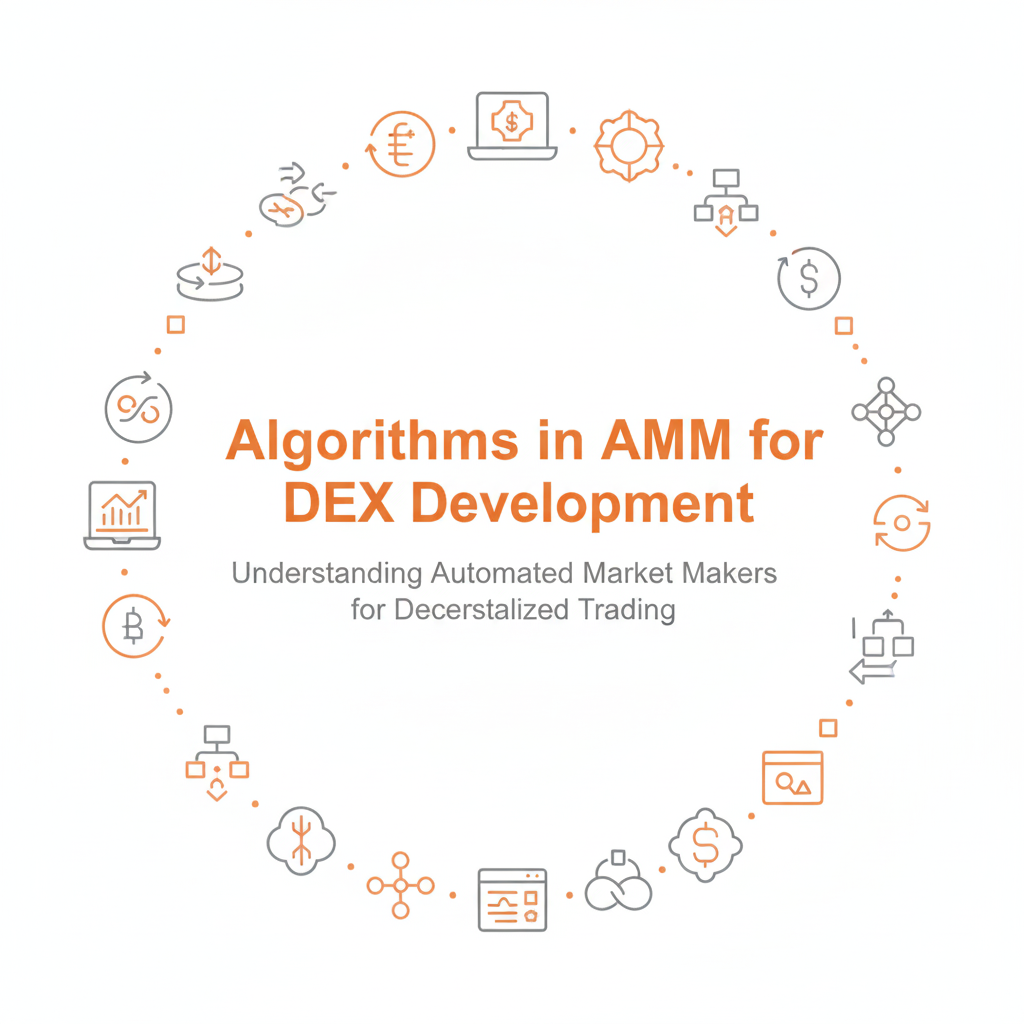Algorithms in AMM for DEX Development

Decentralized exchanges (DEXs) have become an integral part of the cryptocurrency ecosystem, providing a means of trustless trading without centralized intermediaries. A core component enabling decentralized trading on DEXs is the automated market maker (AMM). AMM algorithms help provide continuous liquidity and price discovery on DEX platforms.
In this article, we'll explore key AMM algorithms and how they facilitate decentralized cryptocurrency trading.
What is an Automated Market Maker?
An automated market maker (AMM) system provides liquidity to a decentralized exchange using a mathematical formula. Unlike traditional order book exchanges, AMMs don't require buyers and sellers to place orders. Instead, liquidity pools are created programmatically.
The AMM uses an algorithm to determine asset prices based on the liquidity pool's supply and demand for tokens. This algorithm replaces the order-matching function performed by centralized exchanges.
Key Benefits of AMMs:
- Always provide liquidity, even for low-volume assets
- No order matching needed
- Fairer prices determined algorithmically
- Increased decentralization through trustless trading
Popular AMM Algorithms
There are several AMM algorithms, each with its own unique mechanisms for facilitating trading. Let's explore some of the most widely used.
Constant Product Market Maker
The constant product market maker (CPMM) is the most common AMM algorithm, used by leading DEXs like Uniswap. It works by maintaining a constant product between the quantities of token pairs in a liquidity pool:
x * y = k
Where x and y represent the quantities of tokens X and Y in the pool, and k is a constant.
Whenever a trade occurs, the product is maintained by adding or removing liquidity from the pool. This adjusts the relative token prices automatically based on supply and demand.
CPMM Benefits:
- Simple and efficient algorithm
- Fair token prices based on ratios
- No external data needed to set prices
CPMM Drawbacks:
- Prices can fluctuate with large trades
- Impermanent loss for liquidity providers
- Overall, CPMM offers a straightforward way to facilitate AMM trading, making it a popular choice despite some drawbacks.
Invariant Market Maker
The invariant market maker (IMM) aims to improve on CPMM by using a different formula to determine prices:
x * y = k / (x + y)
Rather than a simple product, it divides the product by the sum of x and y token amounts. This helps mitigate some issues like price volatility and impermanent loss.
IMM Benefits:
- More stable prices
- Lower impermanent loss
- Resilient against manipulation
IMM Drawbacks:
- Added complexity
- Reduced liquidity for large trades
- For developers looking for an AMM with stronger guarantees, IMM offers a more robust algorithm than CPMM.
Kyber Network's Constant Function Market Maker
Kyber Network proposes an alternative AMM model called the Constant Function Market Maker (CFMM). It determines prices using the following formula:
x * y = k * f(x, y)
The function f(x, y) incorporates additional factors beyond just the ratio between token amounts x and y. It takes into account the trading volume and ratios between reserves to improve the market making algorithm.
CFMM Benefits:
- More efficient prices
- Considers multiple liquidity sources
- Dynamic based on real-time data
CFMM Drawbacks:
- Requires oracles for price data
- Higher gas fees due to complexity
- For developers wanting a data-aware solution, CFMM leverages external information to optimize the AMM algorithm.
Uniswap V3's Flexible AMM
Uniswap V3 introduces a flexible AMM model (FMM) with customizable liquidity ranges. Liquidity providers can set price ranges for adding funds to a pool. This allows concentrating liquidity at desired prices.
The FMM formula uses the midpoint price x to determine the pool price y:
y = x + s * (x - x)
Where s is a parameter between 0 and 1 for the price range. This formula enables adjustable liquidity allocation.
FMM Benefits:
- Customizable liquidity ranges
- Improved capital efficiency
- Higher yield potential
FMM Drawbacks:
- Added complexity for LPs
- Fragmented liquidity
- For developers wanting more configurability for liquidity provisioning, FMM adds advanced parameters.
Evaluating AMM Solutions
When evaluating AMM solutions, here are some key considerations:
- Required capital efficiency
- Ability to handle trading volumes
- Price stability needs
- Integration complexity
- Customizability needs
Developers should assess their specific exchange requirements to determine the optimal algorithm. A combination of multiple AMMs can also be leveraged.
Building a Custom AMM
For teams wanting maximum control and customization, building a proprietary AMM algorithm is an option. This allows creating an AMM tailored to your exchange model and tokenomics.
Key aspects of a custom AMM include:
- Formulating pricing equations and ratios
- Programming liquidity pool interactions
- Developing oracles for external data
- Programming incentive mechanisms
- Configuring exchange parameters and interfaces
While complex, a custom AMM unlocks capabilities aligned with your DEX's needs.
Conclusion
AMM algorithms are critical for enabling decentralized trading on cryptocurrency exchanges. Teams have a variety of options to evaluate from established CPMM and IMM models to more advanced CFMM and FMM algorithms.
For people looking to develop out a new decentralized exchange protocol, AMM technology is a crucial component. Assessing your requirements and exploring different AMM solutions will allow creating an automated market maker optimized for your platform's needs. Reach out if you need any guidance building a custom algorithm or implementing an AMM for your DEX architecture.
Recent Knowledge Base
- The Benefits of Fractional NFTs
- Demystifying Token Standards: A Beginner's Guide to Finding the Right Fit for Your Blockchain Project
- 250+ Gaming NFT Ideas to Engage the Users
- Understanding Distributed Ledger Technology (DLT) in Blockchain
- The Effects of PayPal's Stablecoin on Global Banking
- What are the benefits of Crypto Staking?
- What is Blockchain Interoperability in Transactions across Crypto Exchanges?
- Multi-Signature Crypto Wallets: The Future of Organizational Decision Making
- CBDC- A New Revolution into the FinTech!
- White Paper- The Crux of Blockchain Projects!
Categories
Latest news, articles, and updates montly delivered to your inbox.






